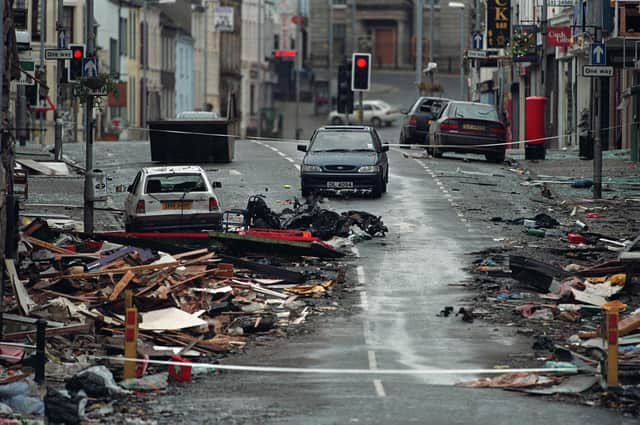Ruth Dudley Edwards: I welcome new Omagh probe but do fear it will end up blaming the Brits


Though I was pleased for those who had worked to achieve this, the news also worried me.
Planted on a sunny Saturday afternoon in a busy shopping area, the bomb killed 29 people, one pregnant with twins, mutilated more than two hundred and traumatised thousands, including police and soldiers who literally picked up pieces.
Advertisement
Hide AdAdvertisement
Hide AdSince the afternoon of August 15 1998, when a close friend rang to tell me what had happened and that his family had narrowly escaped being blown up, I have done everything I could to help get justice for the victims.
I wrote about the atrocity obsessively as a journalist and then became involved with the families who took and won a civil case against the bombers — as a friend, a fund-raiser and a chronicler of an astonishing battle that still dominates the lives of some of them.
Since their victory in 2009, I have attended occasional memorial events, kept up some key friendships and followed the lives of many involved, including the unrepentant perpetrators pursued for the compensation awarded in court, their evasions, bankruptcies and jailings for other crimes and much else.
I even wrote a book about the families’ campaign, for which I read the full transcripts of the inquests, in which ordinary police who performed heroically on that day were cross-examined like criminals.
Advertisement
Hide AdAdvertisement
Hide AdSo after years of observing how skewed is the justice system in Northern Ireland against the security forces, I am fearful that clever lawyers will yet again put good people through hell, while apologists for violent republicans and the ill-informed, who have no clue about the context, will point fingers at the people who were trying to save lives, not take them.
Just to get some facts about this new development straight.
Many Omagh families want no more scrutiny, but in July 2021, a Belfast court ruled for the indomitable Michael Gallagher, father of the 21-year-old Aiden, who had taken a legal challenge demanding a new investigation into whether the attack by the Real IRA could have been prevented.
In his oral statement in parliament, Mr Heaton Harris explained. “The Omagh bombing has been subject to a number of investigations, both immediately after the event and in subsequent years. This includes the original inquest; investigations by the Royal UIster Constabulary, by the Police Service of Northern Ireland, and by the Office of the Police Ombudsman for Northern Ireland; as well as a review at the request of the then Prime Minister, Gordon Brown, by Sir Peter Gibson, the then Intelligence Services Commissioner.”
He summarised the judgment in July 2021 of the Northern Ireland High Court “that plausible arguments could be made that the State had failed to comply with its obligation under Article 2 of the European Convention on Human Rights.”
Advertisement
Hide AdAdvertisement
Hide AdThe “four grounds which gave rise to the plausible arguments of preventability” included “the handling and sharing of intelligence; the use of cell phone analysis; whether there was advance knowledge or reasonable means of knowledge of the bomb; and whether disruption operations could or should have been mounted, which may have helped prevent the tragedy.”
Lord Savile, of the Bloody Sunday Inquiry, is sceptical. Claire Radford, 15 when her 16-year-old brother Alan was killed, summed up how I and many others feel.
“I have conflicting feelings,” she said.
“I am confident there was human error on that day, and that failings will emerge, but the focus should never be taken away from the terrorists who murdered my brother and so many others.”
“I don’t want to see an ex-RUC officer in court for not filling out paperwork correctly. And I don’t want to see a military person, like the one who stood guard over my brother’s body, being dragged before a court. They must not be scapegoated.”
Advertisement
Hide AdAdvertisement
Hide AdAs happened so often, the majority of perpetrators and accomplices lived in the Republic. The judge asked that the Irish government have a similar investigation.
I have little hope that will be thorough.
The conspiracy theorists, the republican apologists and the ignorant are already piling on the pressure on both sides of the border to blame the Brits.
Ruth Dudley Edwards is the author of The Omagh bombing and the Families’ Pursuit of Justice